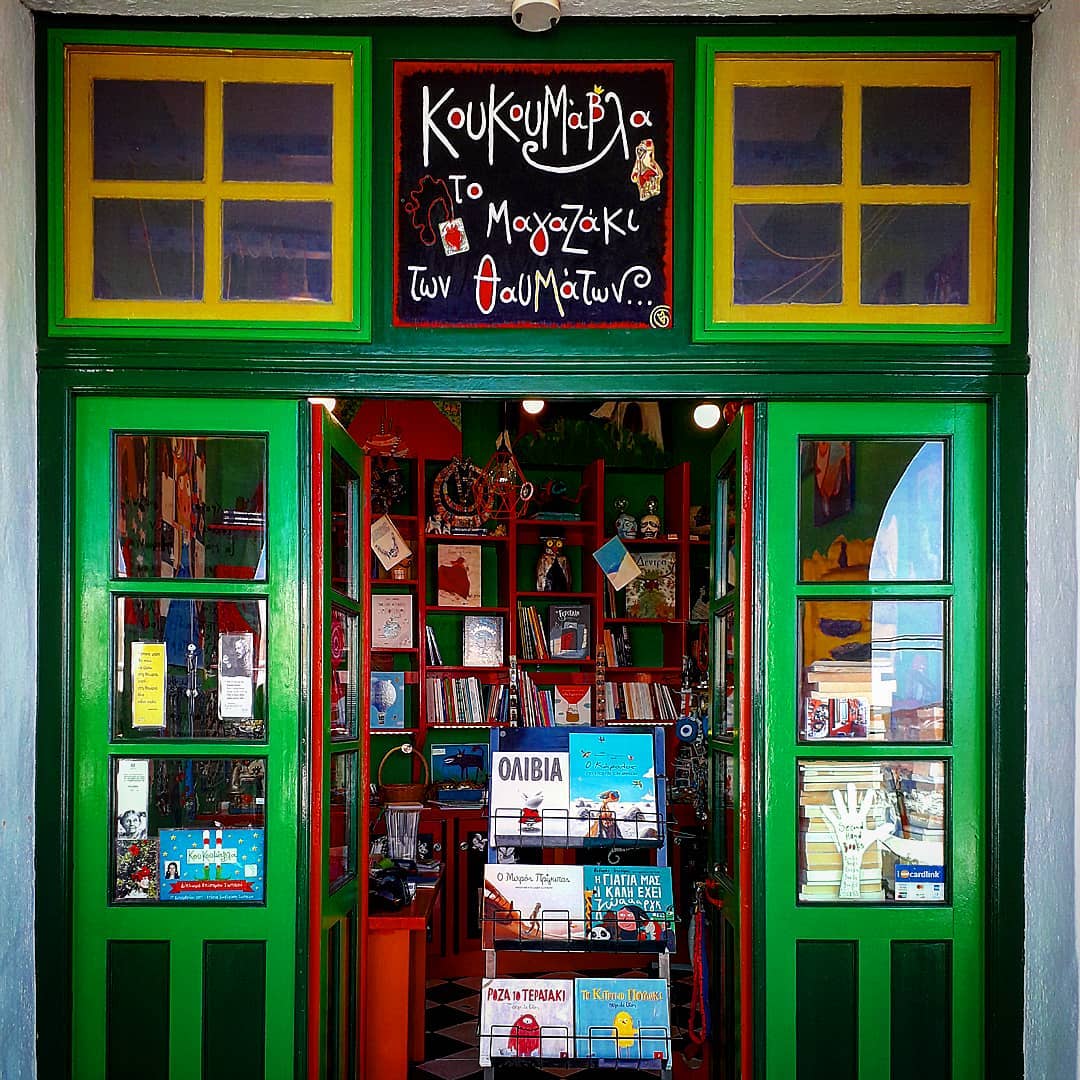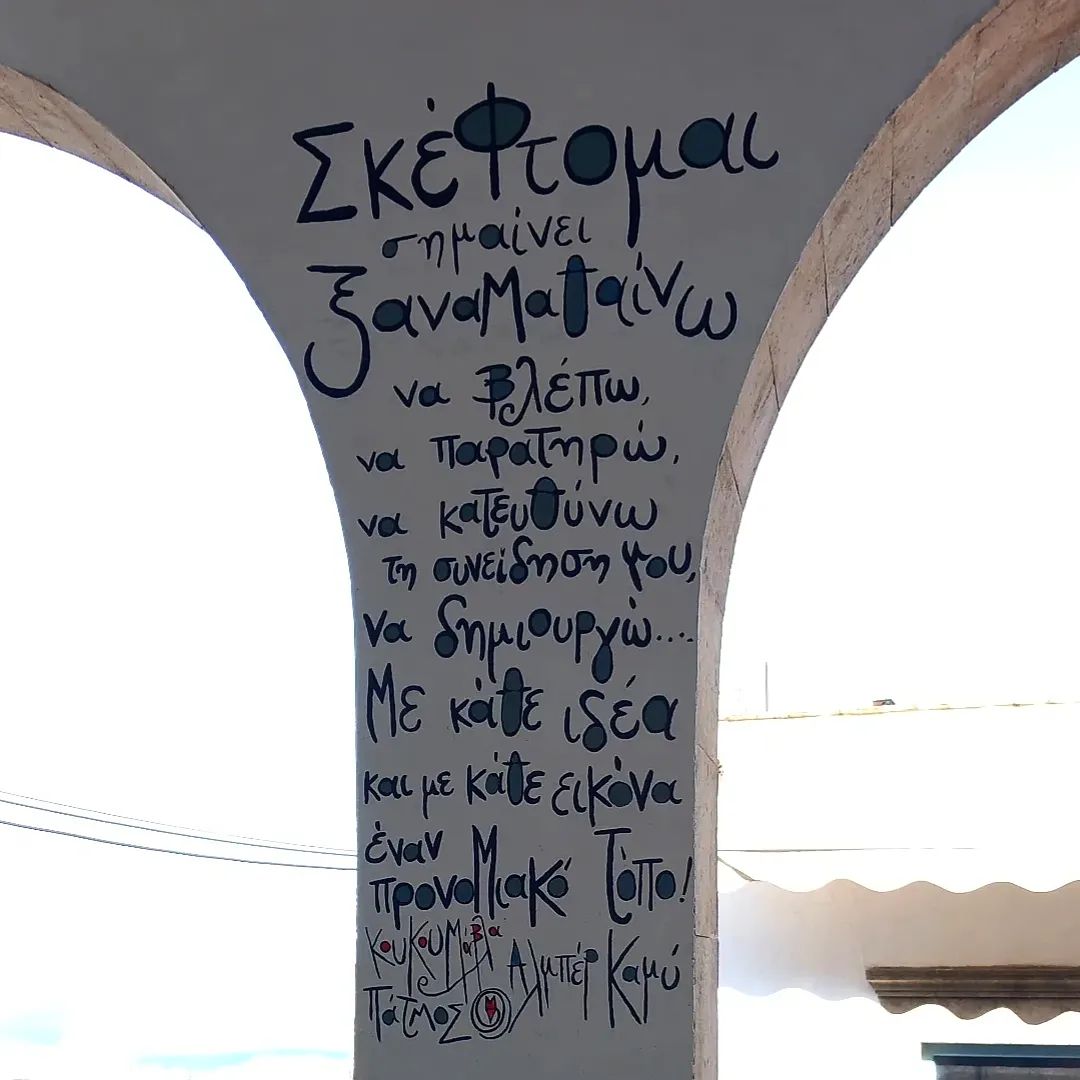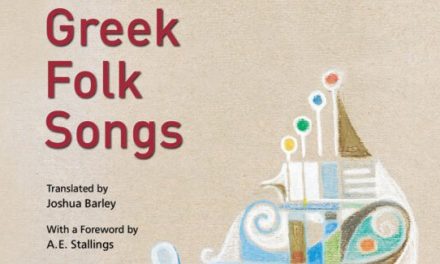Little bookstores constitute an integral part of our culture and our local communities. It’s the place where writers can connect with readers, where we discover new, unknown worlds, where children are captivated by the thrill of reading that can last a lifetime. They are the places that never stop inspiring us, uniting us and spreading the love for books. Their role proves crucial in case they are located in remote areas such as the Greek islands.

Reading Greece* spoke to Despina Melianou, owner of Koukoumavla Bookstore, about the role of little bookstores and their influence on reading preferences, as well as the challenges they are faced with and the prospects ahead.
Koukoumavla is a little bookstore in island of Patmos, aiming to introduce visitors to the magic world of books and art. What’s the story behind this venture of yours?
Κοukoumavla is my alter ego; the space/ world that I have created with my hands – with my whole being – from top to bottom! My grandmother used to call me Koukoumavla since an early age because I used to tell her lies all the time! Τhe owl (“koukouvagia” in Greek) is wise but in our local dialect, Koukoumavla is a bit ‘dumbell’ because it can tell both lies and the truth, like in fairy tales.
In 2003, I opened (together with my husband, Andreas) my first Koukoumavla, in Skala, Patmos. A cafe/bar/Arts & crafts & books. What I did was quite ground-breaking for Greece at the time. It was a place where miracles took place! I called it a multi-purpose space. Storytelling, live music, book presentations, handicraft bazaars, art seminars and a lot more! In 2016, we left this space in Skala and in 2017 I opened my “world”, in Chora, keeping just the Arts & books part. From top to bottom, the choice of books and all the other objects go through my filters; everything has to fit to stay in its place. And everything, everywhere, is about stories, a lot of stories!
I, Koukoumavla with my store of miracles, invite (and challenge!) the visitor to enter the world of Art and Books, and experience it from my own perspective.
What kind of books can readers find in your bookstores?
Well, mostly the ones I’d like to read or the ones I already love! I initially started with poetry and children’s books, which I cherish. Every year, though, my library gets richer and richer. On my shelves you will find books of philosophy, psychology, poetry, fairy tales (folk tradition), literature, comics, essays and of course children’s books. And not only in Greek, but in other languages as well!
How important is the role of little bookstores? How do they influence reading preferences?
I think we’re all a bit crazy in little bookstores. Which equates to us loving the book and defending it with passion! We are reminiscent of the doctor of the soul because we can figure out or guess what book suits each reader. Many times, strangers ask me “what book” to read, and I reply that I don’t know them well enough to know their preferences, but I’m happy to talk to them about my favourites. And just like that, people leave Koukoumavla in the summer with If This Is a Man by Primo Levi, published by Agra. Other times, again, it’s the visitor/reader which catches me “unread” and then they are the ones who recommend a book (that I will love, although I don’t know it yet!). An effervescence of souls happens inside little bookstores!

Which are the main challenges little bookstores face nowadays? How do you respond to these challenges? What about the prospects ahead?
Challenges? Everything is difficult! Even more so for me because it is quite challenging by nature, because of the location, to work nonstop all year long. You have to experience it to understand it. The internet, with a click, brings books to your doorstep much more cheaply. I happen to recommend books, talk about them with all my passion and visitors take pictures of them, saying they will get them from the internet. I have to apologize because in little bookstores it is impossible to have the prices of the big ones. Fortunately, there are still those people who know and support us. There are also ebooks and podcasts, which replace the book as an object. Τhe whole situation about little bookstores is anything but helpful. What’s my reaction? I took a deep breath and I came to the decision not to be so affected by all of this; to continue to give my best to what I do and love for as long as I can. I wish all of us good luck!
Would you say that the recent socio-economic crisis and the pandemic that followed has broken the ties connecting part of the readers with the choices and orientation of traditional publishers, creating an aesthetic and intellectual space that may certainly grow?
I feel like the hero of Ray Bradbury’s Fahrenheit 451. A future unknown but I see me running away, with some hidden book, on me, forever mine! My precious!!
In the era of online communication, how have the social media influenced what people choose to read? How have reading preferences changed/evolved during the years?
I must admit I prefer to paint, read or do whatever I like than to browse in the media. It takes me almost a whole hour to post something on Instagram, for instance. This does not mean that the same happens to the rest of the world. Indeed, social media do affect readership; I find that it affects readers more than it should! Personally, I prefer to be influenced (about books) by the opinions of people I value and myself.
It’s quite often that a book becomes super famous through the media; it’s like The Emperor’s New Clothes (I guess all know this fairy tale…the emperor was naked!). Fortunately, there is also another side to social media; that they exert influence on a healthy level. There are people whose thoughts are similar to ours…and when we meet, my little bookstore, this little microcosm of mine, becomes a huge paradise. And we sprout wings and become eternal angels and go everywhere, flying through time and space!
*Interview by Athina Rossoglou
TAGS: LITERATURE & BOOKS













